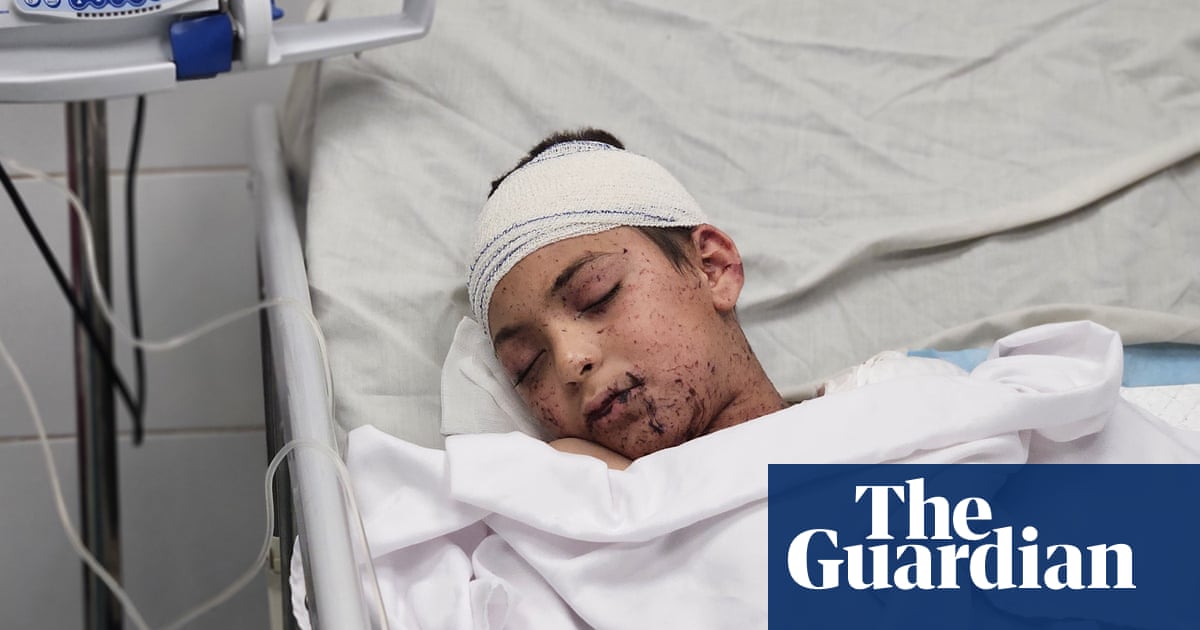A Palestinian doctor whose husband and nine of her 10 children were killed by an Israeli strike has been evacuated from Gaza, bound for Italy with her only surviving child.
Alaa al-Najjar, a paediatrician, and her badly wounded 11-year-old son, Adam, are due to be taken by ambulance with other critically-ill patients and family members to an airport in Eilat on the Red Sea and then flown to Milan on a plane chartered by the Italian government.
Najjar’s familywere killed on 23 May, when their family home in Khan Younis was bombed by Israeli forces. Her husband, Hamdi, had just dropped her at the town’s Nasser hospital where they both worked and had gone home to look after the children when the building was bombed.
Najjar was at the hospital when the charred remains of seven of her children were brought in. Two were found later in the rubble andHamdi died a few days later of his injuries. Adam was the sole survivor. His hand had to be amputated and he suffered severe burns on his body.
“I am not strong. Everyone says I am, they call me a hero because I keep going, but I want the right not to be strong,” Najjar toldLa Repubblica newspaperbefore her evacuation.
“I am a woman whose children were killed, nearly all of them, when all I ever wanted was to protect them. Not just their bodies – I wanted to protect their feelings too. If God allowed this tragedy, there must be a reason. There has to be. But I don’t know what it is.”
Italy’s foreign minister, Antonio Tajani, said Alaa and Adam al-Najjar would be accompanied on the flight to Milan by one of Adam’s aunts and four cousins, as well as the other patients and their families.
In all, Tajani said, 80 Palestinians fromGazawould be flown on three planes to Milan, where they were due to arrive in the evening.
Video footage posted on social media on Wednesday morning showed Najjar, veiled in black, embracing friends and relatives before boarding an ambulance alongside Adam, who waved from the front seat. His left arm was heavily strapped and bandaged.
Their evacuation was arranged by the Italian foreign ministry after an appeal for help from Adam’s uncle Ali al-Najjar, was published in La Repubblica.
TheNajjar children killedwere seven-month-old Sidar, two-year-old Luqman, Sadeen, aged three, Rifan, five, Raslan, seven, Jubran, eight, Eve, nine, Rakan, 10, and Yahya, 12.
“I gave birth to them, I loved them, and I raised them for as long as I could,” their mother said. “They were happy and beautiful before the war.”
The killing of a family of young children focused international attention once more on the toll Israel’s military campaign has takenon young Palestinians in Gaza. More than 16,000 children have been killed and another 34,000 wounded, according to local and UN estimates, since the conflict began on 7 October 2023, triggered by a Hamas attack on Israel.
“I hope to write a new chapter of our life in Italy, but in a different book. I’ll do everything I can. After the surgery, Adam will learn Italian and go to school,” Najjar said.
Asked by his mother about his hopes for the future, Adam said he wanted to “live in a beautiful place”.
“A beautiful place is a place where there are no bombs. In a beautiful place the houses are not broken and I go to school,” he added. “Schools have desks, the kids study their lessons but then they go play in the courtyard and nobody dies.
“A beautiful place is where they operate on my arm and my arm works again. In a beautiful place my mother is not sad. They told me that Italy is a beautiful place.”
